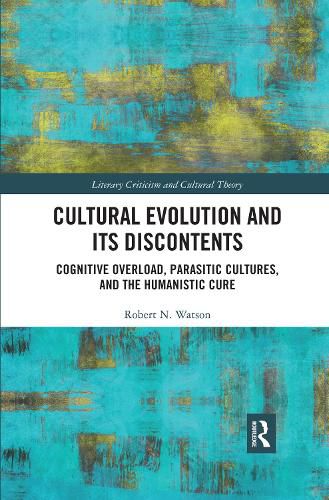Readings Newsletter
Become a Readings Member to make your shopping experience even easier.
Sign in or sign up for free!
You’re not far away from qualifying for FREE standard shipping within Australia
You’ve qualified for FREE standard shipping within Australia
The cart is loading…






People worry that computers, robots, interstellar aliens, or Satan himself - brilliant, stealthy, ruthless creatures - may seize control of our world and destroy what’s uniquely valuable about the human race. Cultural Evolution and its Discontents shows that our cultural systems - especially those whose last names are ism - are already doing that, and doing it so adeptly that we seldom even notice. Like other parasites, they’ve blindly evolved to exploit us for their own survival. Creative arts and humanistic scholarship are our best tools for diagnosis and cure.
The assemblages of ideas that have survived, like the assemblages of biological cells that have survived, are the ones good at protecting and reproducing themselves. They aren’t necessarily the ones that guide us toward our most admirable selves or our healthiest future. Relying so heavily on culture to protect our uniquely open minds from cognitive overload makes us vulnerable to hijacking by the systems that co-evolve with us.
Recognizing the selfish Darwinian functions of these systems makes sense of many aspects of history, politics, economics, and popular culture. What drove the Protestant Reformation? Why have the Beatles, The Hunger Games, and paranoid science-fiction thrived, and how was hip-hop co-opted? What alliances helped neoliberalism out-compete Communism, and what alliances might enable environmentalism to overcome consumerism? Why are multiculturalism and university-trained elites provoking working-class nationalist backlash? In a digital age, how can we use numbers without having them use us instead?
Anyone who has wondered how our species can be so brilliant and so stupid at the same time may find an answer here: human mentalities are so complex that we crave the simplifications provided by our cultures, but the cultures that thrive are the ones that blind us to any interests that don’t correspond to their own.
$9.00 standard shipping within Australia
FREE standard shipping within Australia for orders over $100.00
Express & International shipping calculated at checkout
People worry that computers, robots, interstellar aliens, or Satan himself - brilliant, stealthy, ruthless creatures - may seize control of our world and destroy what’s uniquely valuable about the human race. Cultural Evolution and its Discontents shows that our cultural systems - especially those whose last names are ism - are already doing that, and doing it so adeptly that we seldom even notice. Like other parasites, they’ve blindly evolved to exploit us for their own survival. Creative arts and humanistic scholarship are our best tools for diagnosis and cure.
The assemblages of ideas that have survived, like the assemblages of biological cells that have survived, are the ones good at protecting and reproducing themselves. They aren’t necessarily the ones that guide us toward our most admirable selves or our healthiest future. Relying so heavily on culture to protect our uniquely open minds from cognitive overload makes us vulnerable to hijacking by the systems that co-evolve with us.
Recognizing the selfish Darwinian functions of these systems makes sense of many aspects of history, politics, economics, and popular culture. What drove the Protestant Reformation? Why have the Beatles, The Hunger Games, and paranoid science-fiction thrived, and how was hip-hop co-opted? What alliances helped neoliberalism out-compete Communism, and what alliances might enable environmentalism to overcome consumerism? Why are multiculturalism and university-trained elites provoking working-class nationalist backlash? In a digital age, how can we use numbers without having them use us instead?
Anyone who has wondered how our species can be so brilliant and so stupid at the same time may find an answer here: human mentalities are so complex that we crave the simplifications provided by our cultures, but the cultures that thrive are the ones that blind us to any interests that don’t correspond to their own.